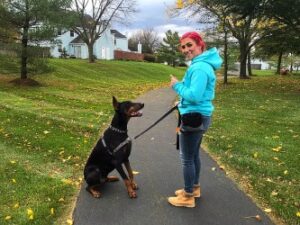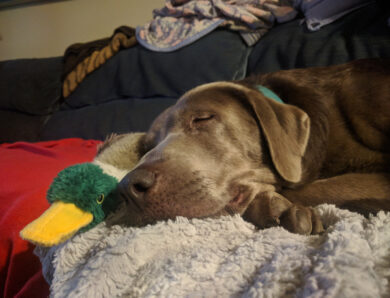
How to Pick a Dog Trainer
Positive reinforcement gives us a happier, healthier dog that wants to listen and be part of the family in a positive way.
If you’re a dog parent, chances are you’re going to need a dog trainer at some point in your pup’s life. Maybe you’re getting a puppy and need him to learn the basic commands. Or perhaps your adult dog is suffering separation anxiety now that you’re returning to the office after a long period of working from home.
But how do you pick the right dog trainer for your best friend’s needs?
Keeping It Pawsome reached out to ace trainer Jaime Caponetta, co-owner of Pawsome University in Monmouth County, New Jersey to find out what dog parents should be asking before hiring anyone.
First, Determine Your Needs
Before starting your search for a trainer, determine what kind of training you need.
Do you have a new puppy? All you need is a positive reinforcement trainer who can teach your new pup the basic commands.
Have a dog that’s leash reactive or recently developed behavioral problems? You’ll need to find a trainer with experience and extra education in behavior modification.
“A regular trainer is not usually trained in those extra things,” says Caponetta. “Thinks like separation anxiety, reactivity on leash to people, kids and babies. Aggression.”
For these issues, you’ll want to look for either a trainer with behavioral consulting education or a behaviorist. (Only vets who have completed extensive specialized training may use the “behaviorist” designation.”)
See the 9 mistakes dog trainers say you’re making with your pup.
Finding a Dog Trainer
Dog trainers are easy to find. A simple google search for your area will almost always result in dozens of possibilities.
For puppy training, you often just need to look as far as your nearest pet store. Most have group puppy training classes that teach the basic commands.
But Caponetta recommends calling your local animal shelter. They’ll have a list of their preferred trainers, all of whom will have lots of education and experience.

Once you’ve determined your needs and narrowed down your list of potential trainers, it’s time to find out more information.
Here are the most important questions you should be asking when it’s time to pick a dog trainer.
What is your overall training philosophy?

This should be the very first question you ask any dog trainer you’re considering.
If the answer is not something along the lines of “positive reinforcement” or “fear free,” move on to the next person on your list.
“Positive reinforcement gives us a happier, healthier dog that wants to listen and be part of the family in a positive way,” says Caponetta.
The days of militant, alpha leader, fear-based training are over.
Watch out for phrases like “leader of the pack.”
Cesar Milan may have made this philosophy famous with his show “Dog Whisperer,” but like militant-style training, it’s outdated and based in fear rather than positive encouragement.
If the trainer you’re speaking with hasn’t mentioned positive reinforcement, ask about their use of tools like prong or shock collars. Those are the hallmarks of more militant-style training and should be avoided at all costs.
“Those are quick fixes,” Caponetta explains. “They don’t actually fix any problems; they make behaviors worse down the line.”
How do you stay up to date with dog training practices?
More important that asking how long a trainer has been in business is finding out how they stay current.
While one can assume that someone who’s been a trainer for 20 years has lots of experience, there’s no way to know for sure if that person has been using the same training methods for 20 years.
As with most industries, there are trends in dog training and new research is continually determining more effective methods that are also healthier for the dog.
If the trainer is well-established, what do they do to continue their education?
If the trainer is newish, what kind of training have they taken? Did it include hands-on classes or was it only online?
What professional certifications do you have?

Every trainer should have at least one professional certification.
Most schools are online but require proof of in-person hours to issue certification. If the trainer you’re talking to is relatively new, ask them how many in-person hours they needed to do to get certified.
Trainers who are dedicated to continuing their education often have multiple certifications, as different programs offer distinct education tracks.
Do you have insurance?
This should be a no-brainer. Every dog trainer should have insurance and should be able to show you proof.
Do you offer a free in-person consultation?
All the education and experience in the world doesn’t matter if your dog and the trainer don’t click with each other. And the only way to discover this is for the trainer to meet your dog in person.
Caponetta says you shouldn’t have to pay for this. It’s not a training session; it’s a meet and greet.
“Every person, every dog is different,” she says. “Their aura, their character.”
You need to see your dog with the trainer to see how she responds, as well as how you feel. Has the trainer made you feel comfortable? Have they done something that you didn’t like?
Looking to add a dog to your family? Here are the top 15 best dogs for a family.
Have you worked with X breed before?
While no dog’s behavior is 100% predicted by its breed, there are some generalities. If your dog is a less-than-common breed and has a strong breed-specific personality, go ahead and ask if the trainer has worked with that breed before.
Great, if they say yes. But don’t necessarily let a no stop you from hiring them.
According to Caponetta, breed traits don’t ultimately help her in her training decisions. There’s simply no way to know how a dog will progress until you start training the dog.
Do I have to sign a contract?
Caponetta is not a fan of contracts that lock customers into a set number of training sessions.
Because every dog is different, there’s no way to know how long it will take yours to learn. Maybe you have a fast learner?
“It could take your dog four times and they’re perfect,” she says. “Why would you pay for 10 sessions?”
Can I speak to previous clients?
As with any other service you’re looking to purchase, speaking with past clients is always a good idea. You can also usually find reviews online. And most trainers will have testimonials on their website.





